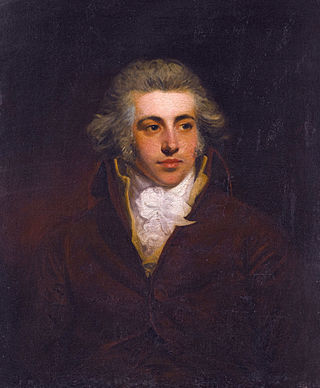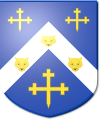
Emily FitzGerald, Duchess of Leinster, known before 1747 as Lady Emily Lennox, from 1747 to 1761 as The Countess of Kildare and from 1761 to 1766 as The Marchioness of Kildare, was the second of the famous Lennox sisters, daughters of Charles Lennox, 2nd Duke of Richmond.

Duke of Leinster is a title in the Peerage of Ireland and the premier dukedom in that peerage. The subsidiary titles of the Duke of Leinster are: Marquess of Kildare (1761), Earl of Kildare (1316), Earl of Offaly (1761), Viscount Leinster, of Taplow in the County of Buckingham (1747), Baron of Offaly, Baron Offaly (1620) and Baron Kildare, of Kildare in the County of Kildare (1870). The viscounty of Leinster is in the Peerage of Great Britain, the barony of Kildare in the Peerage of the United Kingdom, and all other titles in the Peerage of Ireland. The courtesy title of the eldest son and heir of the Duke of Leinster is Marquess of Kildare. The Duke of Leinster is the head of the House of Kildare.

Lieutenant-General James FitzGerald, 1st Duke of Leinster, PC (Ire), styled Lord Offaly until 1743 and known as The Earl of Kildare between 1743 and 1761 and as The Marquess of Kildare between 1761 and 1766, was an Anglo-Irish nobleman, soldier and politician.
Vice-Admiral Charles James FitzGerald, 1st Baron Lecale PC (Ire), styled Lord Charles FitzGerald between 1761 and 1800, was an Irish naval commander and politician.

Robert John Strutt, 4th Baron Rayleigh was a British peer and physicist. He discovered "active nitrogen" and was the first to distinguish the glow of the night sky.

Lord Henry FitzGerald PC (Ire) was the fourth son of the 1st Duke of Leinster and the Duchess of Leinster. A younger brother was the revolutionary Lord Edward FitzGerald.

William Lennox Lascelles FitzGerald-de Ros, 22nd Baron de Ros of Helmsley, PC, DL, was a British soldier and Conservative politician. A general in the Army, he also held political office as Captain of the Yeomen of the Guard in 1852 and between 1858 and 1859.

Frederick Keppel was a Church of England clergyman, Bishop of Exeter.

William Ernest Duncombe, 1st Earl of Feversham, known as The Lord Feversham between 1867 and 1868, was a British Conservative politician.
Charlotte Mary Gertrude Strutt, 1st Baroness Rayleigh, known as Lady Charlotte FitzGerald from 1758 to 1789 and as Lady Charlotte Strutt from 1789 to 1821, was a British peeress.
Joseph Holden Strutt, was a British soldier and long-standing Member of Parliament. He served in the Army and achieved the rank of colonel, and also sat as Member of Parliament for Maldon from 1790 to 1826 and for Okehampton from 1826 to 1830.
Strutt is a surname, and may refer to:
Sir Nigel Edward Strutt DL TD was the chairman of the Strutt & Parker (Farms) Ltd firm of agricultural property consultants, land agents and farm managers. He farmed 22,500 acres (91 km2) in Essex and Suffolk. He was a Deputy Lieutenant for Essex from 1954, and High Sheriff of Essex in 1966. He was offered of a peerage but declined it, as had his great-great-grandfather, Joseph Holden Strutt.

William Robert FitzGerald, 2nd Duke of Leinster, KP, PC (Ire) was an Irish liberal politician and landowner. He was born in London.

Charles William FitzGerald, 4th Duke of Leinster,, styled Marquess of Kildare until 1874, was an Anglo-Irish peer and politician.

Terling Place is the Georgian family seat of Baron Rayleigh and the largest house in the village of Terling, Essex, England.

John Strutt was a British politician who sat in the House of Commons from 1774 to 1790.
Edward Gerald Strutt CH was a British agriculturist who played an important role in British food and agricultural planning during World War I, for which he received the Order of the Companions of Honour in 1917. Other than this, he ran much of his family's estates, served on government committees and he co-founded the surveyors and land agents Strutt & Parker.
Charles Hedley Strutt was a British Conservative Party politician.
Hercules Langford Rowley PC was an Irish politician and landowner.














